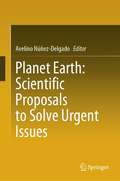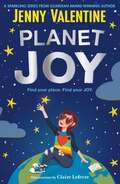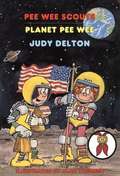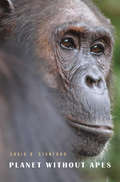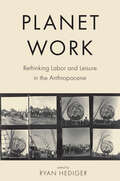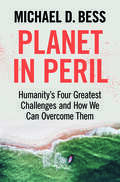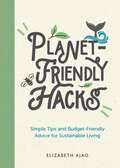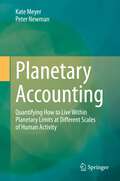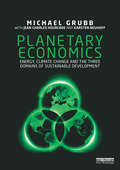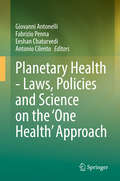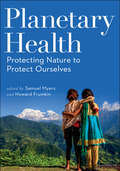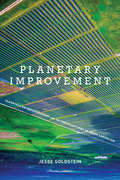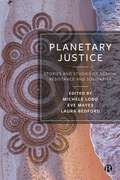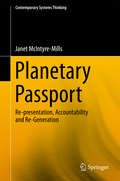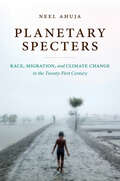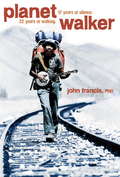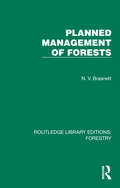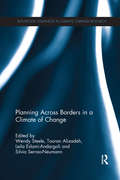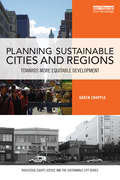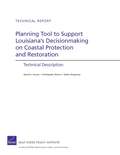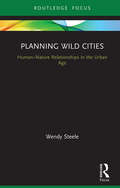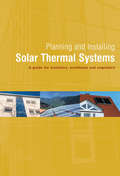- Table View
- List View
Planet Earth: Scientific Proposals to Solve Urgent Issues
by Avelino Núñez-DelgadoThis book represents the most comprehensive overview of issues affecting our planet and the forefront solutions, including climate change, air, water, soil pollution, demography, and access to food and water. This edited book, led by Prof. Núñez-Delgado, counts with the participation of leading researchers across a wide range of disciplines to be an inspiring and motivating document to promote sustainability and biodiversity. Those of you asking for trustworthy analyses about sustainability and climate change and the vanguard solutions will find this book fascinating.
Planet Joy
by Jenny ValentineFor readers aged 9+ comes the third book in a sparkling series about family, friends and finding the joy in life! From Guardian award-winning author Jenny Valentine, this is the perfect series for fans of Jacqueline Wilson, Cath Howe and Lara Williamson! Meet ten-year-old Joy Applebloom, a girl with a knack for finding the silver lining in even the darkest of rainclouds. After years of travelling the world with her family, Joy feels like she&’s finally found a place she can call home. She&’s settled in at school, has a new best friend called Benny and she&’s finally making a difference in the world. But when a new girl, Phoebe Dark, joins class 6C, Joy discovers there&’s a whole world out there that she hasn&’t explored yet . . . Could Plane Tree Gardens be just the beginning?A heart-warming and joyful series about family, friends and never being too small to make a difference, with gorgeous illustrations from Claire Lefevre. 'A delight for its warmth and humour, but principally because the writing is alive and stunning' The Sunday Times on A Girl Called Joy
Planet Ocean
by Paul Watson Jan DutkiewiczVeteran environmental activist and Whale Wars host Paul Watson offers in this interview a provocative and revolutionary view of the state of an environment in crisis. The planet may survive our environmental destruction, he argues, but humans may not. Focused on protecting oceans, preventing the loss of biodiversity, and promoting individual action, Watson's singular call to arms challenges the typical talking points of the modern environmental movement.
Planet Pee Wee (Pee Wee Scouts #34)
by Judy DeltonEveryone in the Pee Wee Scouts wants to win a trip to Camp Blast Off, the super-cool summer camp where kids learn what it's like to be an astronaut. But there's only room for one scout from each troop in the country. So the Pee Wee Scouts set out to make the best project about the planets and the solar system: Roger is building model meteors and stars with light bulbs, Rachel is stirring up a recipe for freeze-dried peanut butter. Find out what Molly and Mary Beth are working on--maybe the most exciting project of all! The Pee Wees goof around, do good deeds, take on projects and have fun and adventures. Find out all about what scouts do in the other 38 Pee Wee Scout books you can get from Bookshare including: #1 Cookies and Crutches, #2 Camp Ghost-Away, #3 Lucky Dog Days, #4 Blue Skies, French Fries, #5 Grumpy Pumpkins, #6 Peanut-Butter Pilgrims, #7 A Pee Wee Christmas, #8 That Mushy Stuff, #9 Spring Sprouts, #10 The Pooped Troop, # 11 The Pee Wee Jubilee, #12 Bad, Bad, Bunnies, #13 Rosy Noses, Frozen Toes, #14 Sonny's Secret, #15 Sky Babies, #16 Trash Bash, # 17 Pee Wees On Parade, #18 Lights, Action, Land-ho!, # 19 Piles of Pets, #20 Fishy Wishes, #21 Pee Wees On skis, #22 Greedy Groundhogs, #23 All Dads on Deck, #24 Tricks and Treats, #25 Pee Wees on First, # 26 Super Duper Pee Wees, #27 Teeny Weeny Zucchinis, #28 Eggs With Legs, #29 Pee Wee Pool Party, #30 Bookworm Buddies, #31 Moans and Groans and Dinosaur Bones, #32 Stage Frightened, #33 Halloween Helpers, #35 Pedal Power, #36 Computer Clues # 37 Wild, Wild West, #38 Here Come the Clowns, and #39 Molly For Mayor.
Planet Without Apes
by Craig B. StanfordPlanet Without Apes demands that we consider whether we can live with the consequences of wiping our closest relatives off the face of the Earth. Leading primatologist Craig Stanford warns that extinction of the great apes—chimpanzees, bonobos, gorillas, and orangutans—threatens to become a reality within just a few human generations. We are on the verge of losing the last links to our evolutionary past, and to all the biological knowledge about ourselves that would die along with them. The crisis we face is tantamount to standing aside while our last extended family members vanish from the planet. Stanford sees great apes as not only intelligent but also possessed of a culture: both toolmakers and social beings capable of passing cultural knowledge down through generations. Compelled by his field research to take up the cause of conservation, he is unequivocal about where responsibility for extinction of these species lies. Our extermination campaign against the great apes has been as brutal as the genocide we have long practiced on one another. Stanford shows how complicity is shared by people far removed from apes’ shrinking habitats. We learn about extinction’s complex links with cell phones, European meat eaters, and ecotourism, along with the effects of Ebola virus, poverty, and political instability. Even the most environmentally concerned observers are unaware of many specific threats faced by great apes. Stanford fills us in, and then tells us how we can redirect the course of an otherwise bleak future.
Planet Work: Rethinking Labor and Leisure in the Anthropocene
by James Armstrong Jennifer K. Ladino Amanda Adams Ted Geier Sharon O'Dair Ryan Hediger David Rodland Sinan Akilli Daniel Clausen Matt Wanat Will Elliot Kevin Maier Jo ReyLabor and labor norms orient much of contemporary life, organizing our days and years and driving planetary environmental change. Yet, labor, as a foundational set of values and practices, has not been sufficiently interrogated in the context of the environmental humanities for its profound role in climate change and other crises. This collection of essays demonstrates the urgent need to rethink models and customs of labor and leisure in the Anthropocene. Recognizing the grave traumas and hazards plaguing planet Earth, contributors expose fundamental flaws in ideas of work and search for ways to redirect cultures toward more sustainable modes of life. These essays evaluate Anthropocene frames of interpretation, dramatize problems and potentials in regimes of labor, and explore leisure practices such as walking and storytelling as modes of recasting life, while a coda advocates reviving notions of work as craft.
Planet in Peril Planetary Dangers: Humanity's Four Greatest Challenges and How We Can Overcome Them
by Michael D. BessWritten by an award-winning historian of science and technology, Planet in Peril describes the top four mega-dangers facing humankind – climate change, nukes, pandemics, and artificial intelligence. It outlines the solutions that have been tried, and analyzes why they have thus far fallen short. These four existential dangers present a special kind of challenge that urgently requires planet-level responses, yet today's international institutions have so far failed to meet this need. The book lays out a realistic pathway for gradually modifying the United Nations over the coming century so that it can become more effective at coordinating global solutions to humanity's problems. Neither optimistic nor pessimistic, but pragmatic and constructive, the book explores how to move past ideological polarization and global political fragmentation. Unafraid to take intellectual risks, Planet in Peril sketches a plausible roadmap toward a safer, more democratic future for us all.
Planet of Microbes: The Perils and Potential of Earth's Essential Life Forms
by Ted AntonWe live in a time of unprecedented scientific knowledge about the origins of life on Earth. But if we want to grasp the big picture, we have to start small—very small. That’s because the real heroes of the story of life on Earth are microbes, the tiny living organisms we cannot see with the naked eye. Microbes were Earth’s first lifeforms, early anaerobic inhabitants that created the air we breathe. Today they live, invisible and seemingly invincible, in every corner of the planet, from Yellowstone’s scalding hot springs to Antarctic mountaintops to inside our very bodies—more than a hundred trillion of them. Don’t be alarmed though: many microbes are allies in achieving our—to say nothing of our planet’s—health. In Planet of Microbes, Ted Anton takes readers through the most recent discoveries about microbes, revealing their unexpected potential to reshape the future of the planet. For years, we knew little about these invisible invaders, considering them as little more than our enemies in our fight against infectious disease. But the more we learn about microbes, the more it’s become clear that our very lives depend on them. They may also hold the answers to some of science’s most pressing problems, including how to combat a warming planet, clean up the environment, and help the body fight off a wide variety of diseases. Anton has spent years interviewing and working with the determined scientists who hope to harness the work of microbes, and he breaks down the science while also sharing incredible behind-the-scenes stories of the research taking place everywhere from microbreweries to Mars. The world’s tiniest organisms were here more than three billion years before us. We live in their world, and Planet of Microbes at last gives these unsung heroes the recognition they deserve.
Planet-Friendly Hacks: Simple Tips and Budget-Friendly Advice for Sustainable Living
by Elizabeth AjaoThis handy guide is brimming with quick tips, life hacks and budget-friendly tricks to help you reduce your carbon footprint and live more sustainablyAn eco-friendly lifestyle is expensive and time-consuming, right? Wrong! There are countless ways to make green choices that don’t take a toll on your time, your bank balance or the planet.This book is your one-stop guide to living a more sustainable lifestyle. Whether you need tips on conserving energy or reducing food waste, or you want to give your home a makeover without impacting the planet, these pages include everything you need to get started. You will find:Clever life hacks to make reducing your carbon footprint that bit easierSimple tips to help you make planet-friendly choices in everyday lifeSmart advice for eco-living on a budgetInspiration for eco-friendly crafts and DIY projectsIt’s more important than ever to do our bit for the environment, and Planet-Friendly Hacks will help you live life to the full without costing the earth.
Planetary Accounting: Quantifying How to Live Within Planetary Limits at Different Scales of Human Activity
by Peter Newman Kate MeyerThis book presents a novel way to enable people, regardless of their scale of influence, to take responsibility for global environmental problems including climate change. It introduces a new framework called Planetary Accounting, which allows the Planetary Boundaries, non-negotiable limits for the environment, to be translated into limits for human activity. It shows how such limits can be broken down into chunks that can be managed at different levels (from individual and community, to business and sector levels, to cities and regions), and at any level of government. The book begins by summarising the science of climate change and introducing the notion of the Anthropocene – the “human age”. It highlights the importance of returning to and remaining within the Planetary Boundaries but shows that we can’t realistically do so unless we have a new approach to environmental accounting.The book then outlines how Planetary Accounting furnishes this new approach by combining sustainability science, change theory, and environmental accounting to create a scalable framework for environmental management that encourages systemic and individual change. The details of the science of and our human contribution to ten critical human pressures are then presented, and the book concludes with a guide for those seeking to apply Planetary Accounting in practice. Planetary Accounting could form the scientific underpinning of behaviour change programs, guide the development of policy and regulations, and provide both the basis for environmental laws, and the foundation of future global environmental agreements. It has been 50 years since the first views from space showed a blue planet alone in our solar system. This book is an historic opportunity to provide humanity for the first time with sufficient information to begin implementing Planetary Accounting.
Planetary Economics: Energy, climate change and the three domains of sustainable development
by Michael GrubbHow well do our assumptions about the global challenges of energy, environment and economic development fit the facts? Energy prices have varied hugely between countries and over time, yet the share of national income spent on energy has remained surprisingly constant. The foundational theories of economic growth account for only about half the growth observed in practice. Despite escalating warnings for more than two decades about the planetary risks of rising greenhouse gas emissions, most governments have seemed powerless to change course. Planetary Economics shows the surprising links between these seemingly unconnected facts. It argues that tackling the energy and environmental problems of the 21st Century requires three different domains of decision-making to be recognised and connected. Each domain involves different theoretical foundations, draws on different areas of evidence, and implies different policies. The book shows that the transformation of energy systems involves all three domains - and each is equally important. From them flow three pillars of policy – three quite distinct kinds of actions that need to be taken, which rest on fundamentally different principles. Any pillar on its own will fail. Only by understanding all three, and fitting them together, do we have any hope of changing course. And if we do, the oft-assumed conflict between economy and the environment dissolves – with potential for benefits to both. Planetary Economics charts how.
Planetary Health - Laws, Policies and Science on the 'One Health' Approach
by Giovanni Antonelli Fabrizio Penna Eeshan Chaturvedi Antonio CilentoThis book offers a multidisciplinary and in-depth analysis of the One Health approach. The holistic One Health vision, a healthcare model based on the integration of various disciplines, is both ancient and current. It is based on the recognition that human health, animal health and ecosystem health are inextricably linked. Cognizant of the need for multidisciplinary research to address complex health challenges at the national and international level, the book combines legal, public policy and medical perspectives on the One Health approach, exploring e.g. the role of biodiversity, human rights, trade agreements, indigenous knowledge, and climate change mitigation and adaptation. One Health is officially recognized by the European Commission and by a host of international organizations as a relevant strategy for actors in all sectors that benefit from collaboration between disciplines (doctors, veterinarians, lawyers, environmentalists, economists, sociologists etc.). One Health is an ideal approach to achieving global health, as it addresses the needs of the most vulnerable populations based on the intimate relationship between their own health, that of their animals, and that of the environment in which they live, considering the wide spectrum of determinants that emerge from this relationship. Given its scope, the book will be of interest to academics, professionals, and students of all disciplines who engage with the One Health approach.
Planetary Health: Protecting Nature to Protect Ourselves
by Howard Frumkin Samuel MyersHuman health depends on the health of the planet. Earth's natural systems—the air, the water, the biodiversity, the climate—are our life support systems. Yet climate change, biodiversity loss, scarcity of land and freshwater, pollution and other threats are degrading these systems. The emerging field of planetary health aims to understand how these changes threaten our health and how to protect ourselves and the rest of the biosphere.Planetary Health: Protecting Nature to Protect Ourselves provides a readable introduction to this new paradigm. With an interdisciplinary approach, the book addresses a wide range of health impacts felt in the Anthropocene, including food and nutrition, infectious disease, non-communicable disease, dislocation and conflict, and mental health. It also presents strategies to combat environmental changes and its ill-effects, such as controlling toxic exposures, investing in clean energy, improving urban design, and more. Chapters are authored by widely recognized experts.The result is a comprehensive and optimistic overview of a growing field that is being adopted by researchers and universities around the world. Students of public health will gain a solid grounding in the new challenges their profession must confront, while those in the environmental sciences, agriculture, the design professions, and other fields will become familiar with the human consequences of planetary changes. Understanding how our changing environment affects our health is increasingly critical to a variety of disciplines and professions. Planetary Health is the definitive guide to this vital field.
Planetary Improvement: Cleantech Entrepreneurship and the Contradictions of Green Capitalism (The\mit Press Ser.)
by Jesse GoldsteinAn examination of clean technology entrepreneurship finds that “green capitalism” is more capitalist than green.Entrepreneurs and investors in the green economy have encouraged a vision of addressing climate change with new technologies. In Planetary Improvement, Jesse Goldstein examines the cleantech entrepreneurial community in order to understand the limitations of environmental transformation within a capitalist system. Reporting on a series of investment pitches by cleantech entrepreneurs in New York City, Goldstein describes investor-friendly visions of incremental improvements to the industrial status quo that are hardly transformational. He explores a new “green spirit of capitalism,” a discourse of planetary improvement, that aims to “save the planet” by looking for “non-disruptive disruptions,” technologies that deliver “solutions” without changing much of what causes the underlying problems in the first place.Goldstein charts the rise of business environmentalism over the last half of the twentieth century and examines cleantech's unspoken assumptions of continuing cheap and abundant energy. Recounting the sometimes conflicting motivations of cleantech entrepreneurs and investors, he argues that the cleantech innovation ecosystem and its Schumpetarian dynamic of creative destruction are built around attempts to control creativity by demanding that transformational aspirations give way to short-term financial concerns. As a result, capitalist imperatives capture and stifle visions of sociotechnical possibility and transformation. Finally, he calls for a green spirit that goes beyond capitalism, in which sociotechnical experimentation is able to break free from the narrow bonds and relative privilege of cleantech entrepreneurs and the investors that control their fate.
Planetary Justice: Stories and Studies of Action, Resistance and Solidarity
by Kuntala Lahiri-Dutt Jenia Mukherjee Yin Paradies Aditya Ghosh Kalyan Rudra Amrita Sen Anwesha Haldar Lakshminarayan Satpati Sharon Stein Marlies Kustatscher Anne Poelina Aleryk Fricker Natasha Abhayawickrama Alex Baird Robin A Bellingham Sanjana Dutt Souvik Lal Chakraborty Beth Christie Alicia Flynn Naomi Godden Lowell Hunter Callum McGregor Ruchira Talukdar Dani Villafaña Bill Webb Sandra Wooltorton Julian S. YatesAvailable open access digitally under CC-BY-NC-ND licence. Bringing together interdisciplinary climate change scholarship and grassroots activism, this book considers the possibilities of planetary justice across human difference, generations, species and the concept of life and non-life. Writing amidst bushfires, cyclones, global climate strikes and a global pandemic, contributors from the Earth Unbound Collective share stories from India, Australia, Canada and Scotland. Chapters draw on Indigenous, Black, Southern, ecosocialist and ecofeminist perspectives to call for more radical and interconnected ideas of justice and solidarity. This accessible book features diverse voices that speak with the planet in the face of climate change, biodiversity loss and extinction. It explores the politics and practices of working towards a future where the planet thrives.
Planetary Passport
by Janet Mcintyre-MillsThis book explores the implications of knowing our place in the universe and recognising our hybridity. It is a series of self-reflections and essays drawing on many diverse ways of knowing. The book examines the complex ethical challenges of closing the wide gap in living standards between rich and poor people/communities. The notion of an ecological citizen is presented with a focus on protecting current and future generations. The idea is to track the distribution and redistribution of resources in the interests of social and environmental justice. The central argument looks for ways to hold the powerful to account so as to enable virtuous living by the majority to be demonstrated in what the author calls a "planetary passport" - a careful use of resources and a way to provide safe passage to those in need of safe habitat. The book argues that nation states need to find ways to control the super-rich through the governance process and to enhance a sense of shared ecological citizenship and responsibility for biodiversity. The fundamental approach is collaborative research. Planetary Passport: Representation, Accountability and Re-Generation is comprised of six chapters. Chapter 1 begins by making a case for a paradigm shift away from business as usual and the pursuit of profit at the expense of the social and environmental fabric of life. The aim is to explore alternatives and to discuss some ways of achieving wellbeing whilst the focus is on human rights, discrimination and outlining the notion of a planetary passport. Chapter 2 makes a specific link between people and the planet as a basis for understanding the nature of hybridity and interconnectedness and the implications for ethics. Chapter 3 focuses on building this planetary passport for social and environmental justice in order to enable people with complex needs to consider the consequences of either continuing to live the same way as before or making changes to the way that they live. Meanwhile Chapter 4 does the same as the previous chapter, but explores the political context of consumption and short term profit Chapter 5 examines the challenges and opportunities that come from explorations within a cross-cultural learning community. This includes a look at co-creation and co-determination. Finally Chapter 6 ends with a look to the future and a potential new framework for people and the planet through a planetary passport.
Planetary Specters: Race, Migration, and Climate Change in the Twenty-First Century
by Neel AhujaNeel Ahuja tracks the figure of the climate refugee in public media and policy over the past decade, arguing that journalists, security experts, politicians, and nongovernmental organizations have often oversimplified climate change and obfuscated the processes that drive mass migration. To understand the systemic reasons for displacement, Ahuja argues, it is necessary to reframe climate disaster as interlinked with the history of capitalism and the global politics of race, wherein racist presumptions about agrarian underdevelopment and Indigenous knowledge mask how financial, development, migration, and climate adaptation policies reproduce growing inequalities. Drawing on the work of Cedric Robinson and theories of racial capitalism, Ahuja considers how the oil industry transformed the economic and geopolitical processes that lead to displacement. From South Asia to the Persian Gulf, Europe, and North America, Ahuja studies how Asian trade, finance, and labor connections have changed the nature of race, borders, warfare, and capitalism since the 1970s. Ultimately, Ahuja argues that only by reckoning with how climate change emerges out of longer histories of race, colonialism, and capitalism can we begin to build a sustainable and just future for those most affected by environmental change.
Planetwalker
by John FrancisFrancis' journey began in 1971 when after witnessing an oil spill in San Francisco bay he gave up using motorized transport, and tired of arguing with his friends about whether he was making a difference or not, he gave up speaking. In 1983, in an effort to raise environmental awareness, he set off on foot and in silence across the US and continued to walk for the next 22 years, earning undergraduate and Masters degrees in science and environmental studies and a Ph. D. in land resources along the way. Here he presents the story of his pilgrimage which covered ground from the Pacific to Atlantic coasts, the South American continent from tip to tip, Cuba, and both Alaska and Antarctica. His pen and ink sketches illustrate the margins of practically every page. Annotation ©2009 Book News, Inc. , Portland, OR (booknews. com)
Planned Management of Forests (Routledge Library Editions: Forestry)
by N. V. BrasnettOriginally published in 1953, this book was compiled to provide students of forestry with a simple outline of what the management of forests involves, and of the way in which forestry operations are organized and controlled. Topics discussed and explained include economic considerations, stock mapping, topography, climate, soils, form and distribution of crops, scientific forestry, destruction of forests, regulation by volume, area and size and forest protection.
Planning Across Borders in a Climate of Change (Routledge Advances in Climate Change Research)
by Wendy Steele Silvia Serrao-Neumann Tooran Alizadeh Leila Eslami-AndargoliThe fixity or mobility of borders are key themes within the border studies literature and have useful critical application to urban and environmental planning through theory, pedagogy and practice. This offers potential for transformative change through the processes of re-bordering and re-orienting established boundary demarcations in ways that support and promote sustainability in a climate of change. Planning Across Borders in a Climate of Change draws on a range of diverse case studies from Australasia, North and South America, Europe, Africa, the Middle East and Asia and offers the application of border theory, concepts and principles to planning as a critical lens. It applies this lens to a range of international case studies in key areas such as climate change adaptation, food security, spatial planning, critical infrastructure and urban ecology. This collection fills an important gap in the border studies literature, bringing climate change considerations to bear on planning. It should be of interest to students, scholars and professionals in the field of urban and environmental planning, climate change adaptation, border studies, urban studies, human and political geography, environmental studies and development.
Planning Climate And Global Change Research: A Review Of The Draft U.s. Climate Change Science Program Strategic Plan
by Committee to Review the U.S. Climate Change Science Program Strategic PlanThe National Academies Press (NAP)--publisher for the National Academies--publishes more than 200 books a year offering the most authoritative views, definitive information, and groundbreaking recommendations on a wide range of topics in science, engineering, and health. Our books are unique in that they are authored by the nation's leading experts in every scientific field.
Planning Sustainable Cities and Regions: Towards More Equitable Development (Routledge Equity, Justice and the Sustainable City series)
by Karen ChappleAs global warming advances, regions around the world are engaging in revolutionary sustainability planning - but with social equity as an afterthought. California is at the cutting edge of this movement, not only because its regulations actively reduce greenhouse gas emissions, but also because its pioneering environmental regulation, market innovation, and Left Coast politics show how to blend the "three Es" of sustainability--environment, economy, and equity. Planning Sustainable Cities and Regions is the first book to explain what this grand experiment tells us about the most just path moving forward for cities and regions across the globe. The book offers chapters about neighbourhoods, the economy, and poverty, using stories from practice to help solve puzzles posed by academic research. Based on the most recent demographic and economic trends, it overturns conventional ideas about how to build more livable places and vibrant economies that offer opportunity to all. This thought-provoking book provides a framework to deal with the new inequities created by the movement for more livable - and expensive - cities, so that our best plans for sustainability are promoting more equitable development as well. This book will appeal to students of urban studies, urban planning and sustainability as well as policymakers, planning practitioners, and sustainability advocates around the world.
Planning Tool to Support Louisiana's Decisionmaking on Coastal Protection and Restoration
by David G. Groves * Christopher Sharon * Debra KnopmanA computer-based decision-support tool, called the Coastal Protection and Restoration Authority (CPRA) Planning Tool, provided technical analysis that supported the development of Louisiana's Comprehensive Master Plan for a Sustainable Coast through CPRA and community-based deliberations. This document seeks to provide an accessible technical description of the Planning Tool and associated analyses used to develop the Master Plan.
Planning Wild Cities: Human–Nature Relationships in the Urban Age (Routledge Research in Sustainable Urbanism)
by Wendy SteeleThis book critically engages with the contemporary challenges and opportunities of wild cities in a climate of change. A key focus of the book is exploring the nexus of possibilities for wild cities and the eco-ethical imagination needed to drive sustainable and resilient urban pathways. Many now have serious doubts about the prospects for humanity to live within cities that are socially just and responsive to planetary limits. Is it possible for planning to better serve, protect and nurture our human and non-human worlds? This book argues it is. Drawing on international literature and Australian case examples, this book explores issues around climate change, colonization, urban (in)security and the rights to the city for both humans and nature. It is within this context that this book focuses on the urgent need to better understand how contemporary cities have changed, and the relational role of planning within it. Planning Wild Cities will be of particular interest to students and scholars of planning, urban studies, and sustainable development, and for all those invested in re-shaping our ‘wild’ city futures.
Planning and Installing Solar Thermal Systems: A Guide for Installers, Architects and Engineers (Planning and Installing)
by German Solar Energy Society (DGS)Solar thermal systems available today offer efficiency and reliability. They can be applied in different conditions to meet space- and water-heating requirements in the residential, commercial and industrial building sectors. The potential for this technology and the associated environmental benefits are significant. This fully updated edition of 2004's bestselling guide offers clear guidance on planning and installing a solar thermal system, crucial to the successful uptake of this technology. All major topics for successful project implementation are included. Beginning with resource assessment and an outline of core components, it details solar thermal system design, installation, operation and maintenance for single households, large systems, swimming pool heaters, solar air and solar cooling applications. Details on how to market solar thermal technologies, a review of relevant simulation tools and data on selected regional, national and international renewable energy programmes are also provided. In short, the book offers comprehensive guidance for professionals who wish to install solar thermal technology and is a highly valued resource for architects and engineers alike who are working on new projects, electricians, roofers and other installers, craftsmen undertaking vocational training and anyone with a specialized and practical interest in this field. Published with DGS
